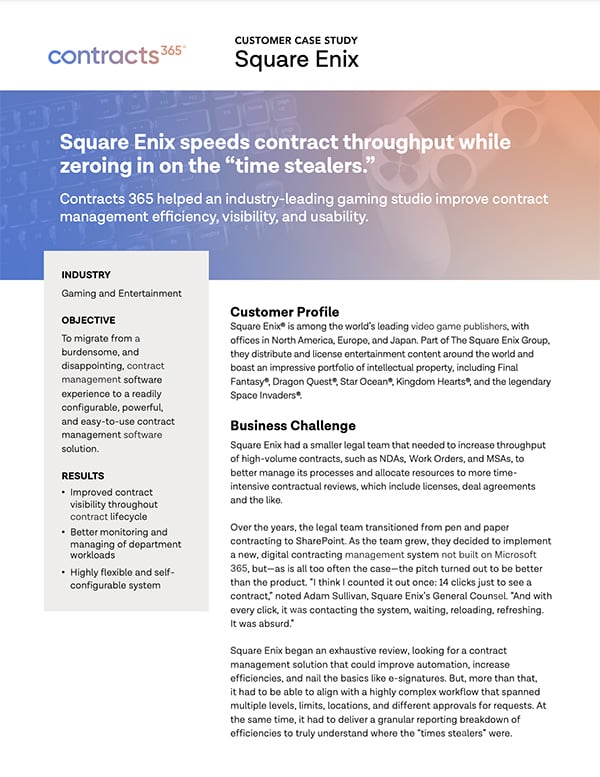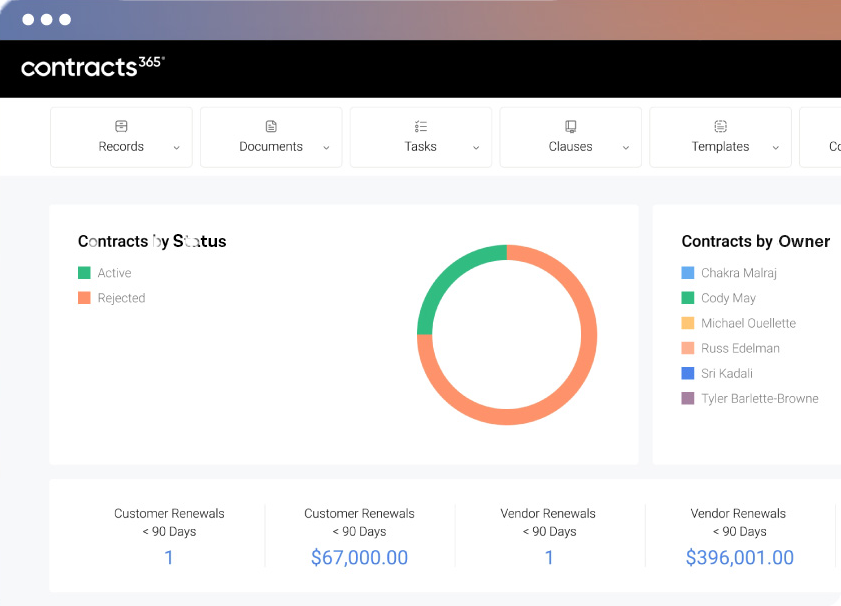Contracts form the cornerstone of your business. They are formal promises between parties, essential agreements that govern every aspect of your daily operations. Contracts are not simply legal technicalities: They can also set the tone of a relationship. Choosing to uphold your responsibilities in a contract, and the actions you take when obligations are not met, both say a lot about how you do business.
Tracking your contracts to ensure compliance is essential to risk management. It is also fundamental to maintaining your reputation within your industry. Almost always, violating a contract costs you money and damages trust between business partners. This overview is a reminder of what the legal process for breach of contract actually is, and how your contract management software can detect or prevent it.
Optimal contract management software, or contract lifecycle management software, offers high-level tools to prevent breach of contract. It also provides ways for you to identify how existing contracts can offer business value. Recognizing that each contract is a unique agreement, contract management software helps you to uphold strong relationships and pursue appropriate breach remedies if they become necessary.
Basics of Breach of Contract
In its most basic terms, a contract is an agreement to exchange items or services of value. Breach of contract means failing to meet the terms of that agreement. Everyone is probably familiar with the adage that even a handshake can lead to a legally binding contract, which is sometimes true if all of the elements of an agreement are in place.
In modern commercial enterprise, however, contracts are typically lengthy and detailed. They contain numerous clauses that set the terms of the relationship. Those can be anything from monthly payment schedules to non-disclosure agreements that survive the term of the contract. So, when does a failure to meet a condition result in legal action?
There are generally four types of contract breaches. They help distinguish between a minor oversight and a break that goes to the heart of the contract's intention. Despite these distinctions, every breach entitles the injured party to some recourse. Nonetheless, it is vital to put a breach into perspective, before damaging a valuable business relationship or pursuing costly legal action.
- Minor Breach: The core elements of the contract have been upheld. The broken condition does not excuse either party from remaining obligated to the contract.
- Material Breach: One party has violated a core term of the contract. The non-breaching party may be excused from performing under the agreement and may sue.
- Fundamental Breach: The violation is so major that the other party may choose to terminate the contract and may sue.
- Anticipatory Breach: The violation happens in advance of specific timelines in the agreement.
These may sound straightforward. But in real life, the line is often blurry between a minor and a material breach. The parties may disagree about what happens next after one side has failed to uphold a legal promise. They often have to seek resolution through a third party in order to determine what's fair going forward.
For that reason, it is generally a good idea for non-breaching parties to follow legal advice -- which may mean continuing to perform the obligations as expected, at least for the time being. That means continuing to use your internal contract monitoring software to meet your deadlines and stay informed about your upcoming responsibilities.
Does Every Breach Void the Entire Agreement?
There's a common misconception that a business can get out of a contract as soon as the other party does something wrong. That's not the case. As you can see by reviewing the different kinds of breaches, it usually takes a very serious error or deliberate action on the part of one party for the agreement to fall apart.
That isn't to say that a minor breach is not serious. But it brings home the point that business relationships tend to stick, good or bad. Most business entities intend to uphold the agreement and want the other party to do the same. But even if things don't go as intended, it may still be necessary to communicate and find resolution. Rarely can either party simply wash their hands of the whole thing and walk away.
Resolution Methods
The other common misconception is that deciding what to do about a breach involves one process: going to court. In most situations, that isn't the case at all. In fact, most commercial contracts will have a clause that outlines exactly what happens in the event of a dispute. For complicated contracts, this is an essential element that gives both parties important guidelines.
A dispute resolution clause will set out who will resolve any conflicts. Those potential conflicts can include disagreements about what a contract means, as well as what to do if there has been a breach. The clause will set out which set of laws apply (i.e., jurisdiction), format (mediation, arbitration, litigation), and decision-maker. It may also lay out specific steps the parties must take before handing the dispute over to a judge or arbitrator for resolution.
Often, parties do have the option to go to court if they wish. But dispute resolution with a mediator or arbitrator is legally binding. It is also private, saving both parties the negative publicity that may surround an ugly conflict. Just like with a litigated resolution, a binding mediation agreement or arbitrator's decision is enforceable.
Remedies for Breach of Contract
Once there has been a breach, there are a number of different ways the breach can be resolved. It depends on the severity of the breach and the desires of the parties. There are three different kinds of remedies for breach of contract:
- Damages: Perhaps the most common remedy, this is financial compensation for the loss that occurred as a direct result of the breach.
- Specific Performance: A less common remedy, specific performance puts the onus on the breaching party to perform the obligation it has failed to perform.
- Cancellation and Restitution: The most severe remedy, this allows the non-breaching party to cancel the contract in its entirety. That party can also sue for damages to compensate for losses that resulted from the breach.
Depending on the resolution method, the parties can agree on how to resolve the breach or a third party can decide what remedies are appropriate. It is typically always an option for a single breach to have a variety of remedies, such as payment of damages as well as specific performance.
It is important to note that what is a material breach in one contract may be a minor breach in another. This may be best explained through an example. If you are a retail store with inventory that constantly rotates, late delivery of product may be a minor infraction. It might then only be a minor breach.
But if you are a food service business dependent on an on-time, daily delivery of specific ingredients that you cannot operate without, a late delivery may be a material breach. That's especially the case if you include a phrase such as "time is of the essence" in your contractual language as a form of legal protection.
Typically, a more serious breach will lead to more substantial remedies. Understanding how a breach may "rate" in a particular contract is a valuable piece of information that your contract monitoring team should have. That way, they can be proactive in preventing and resolving conflicts throughout the lifecycle of the company's contracts.
Understanding Your Contractual Obligations
When a business is party to numerous contracts, it is essential to understand the obligations in every one. That includes identifying what in each contract may be minor or material. Because each individual agreement is a stand-alone promise between parties, you cannot rely on software that identifies a particular clause in isolation as "minor" or "material" across all contracts.
That's why contract management software is so crucial to prevent breach of contract. With the software in place, you can identify the essential pieces of information:
- Currently active contracts
- Upcoming deadlines
- Essential obligations
- Risk potential if obligations are missed
Your contracts should be easily accessible for review at any time. But no business owner has unlimited time to continually track contractual obligations. In order to support the day-to-day operations and ensure leaders are holding up their end of the bargain, it helps to have technology.
Download the Mohegan Case Study
Learn More
Using Software Technology to Monitor Contracts
Contract management software is just that piece of technology. It is not merely a database of PDFs of contracts; it provides essential visibility into business terms and obligations so that you know exactly what your team has to do, and when. When fully integrated into your other operational systems, you can continue running your business without worrying that you have a performance responsibility that you have yet to meet.
Contract monitoring is essential for a variety of reasons.
- It helps you to uphold your contractual obligations. You do not have to worry about potentially entering into a dispute with an important business partner. This helps save your business's reputation, and allows you to avoid costly damages and legal fees that can result from a breach.
- Contract monitoring keeps your business relationships on track. You are in step with your suppliers' demands, and know whether their operations are ideal for your business. When time comes to renew, renegotiate, or extend the contract, you have accessible, relevant data to consider. It is easier for you to compare your current business partners with suppliers who may offer you a better deal.
- Contract monitoring helps you to manage overall risk. You can anticipate shortfalls well in advance of looming deadlines. You can take a proactive approach to your legal agreements if business conditions have changed your ability to uphold a prior agreement.
- With solid, manageable contracts in place, your business is a better bet to outside financers, who want to know that you are staying on track with your short- and long-term goals and strategies. Long-term contracts are valuable "intangible" assets that parties look at as part of outside valuation, such as in advance of a buyout.
The Latest Software Solutions
The complexity of commercial contracts used to mean each company had a full team dedicated to monitoring and fulfilling obligations. Modern contract management software can relieve this internal pressure on your staff and ensure superior contract tracking. The right technology partner can offer secure, accessible, and efficient service.
Contract management software allows you to gain insights to discover business value in existing agreements. At the same time, the process helps you to reduce risk and ensure contractual compliance. The right software can help you to stay on top of your legal obligations, one contract at a time.
If you’d like to learn more about our Contract Management Software for businesses that run Microsoft 365, please don’t hesitate to reach out to us or, even better, request a demo and we can show you how it works in real-time.
Subscribe and receive our latest blog articles in your work email.
We value your privacy. By subscribing, you agree to receive our newsletter. We’ll protect your personal data and use your email only for sending useful information. You can unsubscribe anytime. For details on data handling, please see our privacy policy.
Ready to Learn More?
Optimize your team’s contract lifecycle management with Contracts 365®
